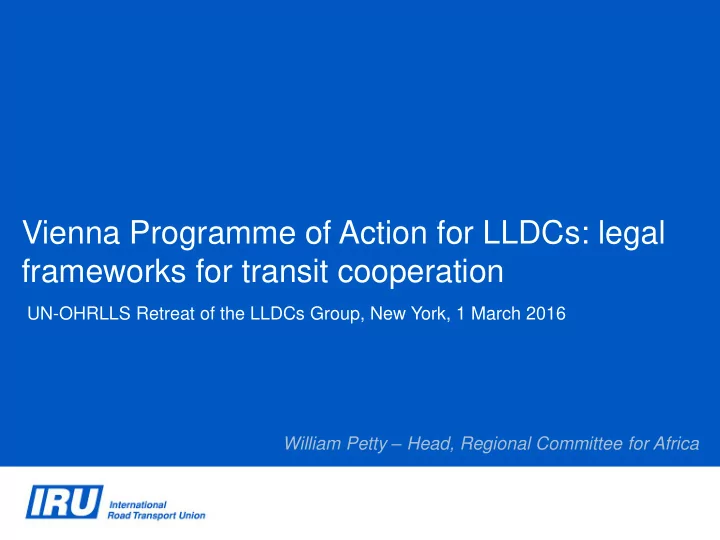

Vienna Programme of Action for LLDCs: legal frameworks for transit cooperation UN-OHRLLS Retreat of the LLDCs Group, New York, 1 March 2016 William Petty – Head, Regional Committee for Africa
Efficient road transport 1. Good infrastructure 2. Harmonised legislative frameworks to facilitate trade and international road transport 3. Service excellence 2
Global transit frameworks WTO TFA – legal framework for trade facilitation • Article 11: Freedom of Transit WCO Revised Kyoto Convention – legal framework for simplified, harmonised customs procedures • Specific Annex E: standards & guidelines on Transit UN Harmonisation Convention – legal framework for simplified, harmonised control procedures for international movement of goods • Chapter III: provisions concerning Transit • Annexes: customs, sanitary, phytosanitary, veterinary, standards, vehicles, drivers, rail • International Technical Inspection Certificate • International Vehicle Weight Certificate UN TIR Convention – legal and procedural/operational framework for Transit 3
Afghanistan Armenia Azerbaijan Bhutan Global transit frameworks Bolivia Botswana Burkina Faso Burundi CAR Chad Ethiopia Kazakhstan Kyrgyzstan Lao PDR Lesotho Macedonia (FYRO) 4 Malawi Mali Moldova Mongolia Nepal Niger Paraguay Rwanda Swaziland Tajikistan Turkmenistan Uganda Uzbekistan Zambia Zimbabwe
Implementation is key Acceding to a Convention is a critical first step – but the benefits only come from effective implementation • TRIE in West Africa • $1320, $720 or $100 in transit fees for a movement of tyres from Mombasa to Kigali? 5
Facilitating the safe movement of specific goods Some goods are particularly vulnerable to burdensome control measures • ADR Agreement – sets safety standards for the transport of dangerous goods, but ensures facilitation for transports complying with ADR • ATP Agreement – sets standards for movement of perishable foodstuffs 6
Facilitating transport contracts It can be complicated, and costly, for a shipper in an LLDC to negotiate (or dispute) a transport contract • CMR Convention – fixes the conditions governing the contract for the international carriage of goods by road. Establishes liability between carrier and shipper 7
Private sector-driven solutions Additional charges – e.g. container deposits Professionalism – driver training can improve fuel efficiency 5%-20% 5% improvement could equal $1200 per year per truck Rwanda: 500 trucks = $600,000 per year 8
Recommend
More recommend